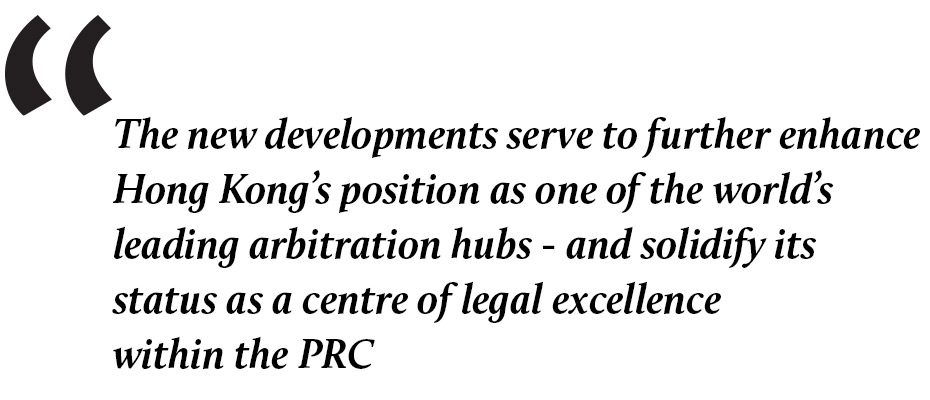A pro-arbitration approach has solidified Hong Kong’s status as a leading arbitration hub and centre of legal excellence
Hong Kong is the beating heart of arbitration in Asia. Nestled within the firmament of China’s Greater Bay Area, its status as a leading arbitration hub has been reinforced over the years by the pro-arbitration attitude that infuses Hong Kong courts, all underpinned by the introduction of innovative arrangements enhancing the dispute resolution experience for those who choose arbitration in the city.
The past 12 months have seen a continuation of this trend and this article focuses on three recent developments: (1) the recent trilogy of judicial decisions re-examining the nature of tiered dispute resolution clauses; (2) the prospective introduction of legislation allowing outcome-related fee structures in arbitration; and (3) the entry into effect of provisions of the supplemental arrangement concerning mutual enforcement of arbitral awards between mainland China and Hong Kong – which not only further enhances the reciprocal enforcement of awards but also, for the first time, allows simultaneous enforcement of awards between both jurisdictions.
TIERED CLAUSES

Arbitrator
Temple Chambers in Hong Kong
Tel: +852 2523 2003
The issue of whether non-compliance with a pre-arbitral requirement in a tiered arbitration clause deprives a tribunal of jurisdiction, or whether it simply goes to the admissibility of claims, is an issue that has bedevilled courts worldwide in recent years.
It came before the Hong Kong courts for the first time in C v D (2021). The relevant arbitration clause provided that the dispute shall be referred to arbitration “if any dispute cannot be resolved amicably within 60 business days of a party’s request in writing for such negotiation”. There was a dispute over whether the requisite written request had been issued. Having found that there was such compliance, the tribunal proceeded with the arbitration.
The unsuccessful party applied to the Hong Kong Court of First Instance under section 81 of the Arbitration Ordinance to set aside the award on the grounds that the tribunal lacked jurisdiction. The key issue was whether compliance with the condition precedent went to the jurisdiction of the tribunal (and thus was reviewable by the court), or the admissibility of the claim (which could not be reviewed by the court).
Justice Godfrey Lam held that the issue went to admissibility and accordingly dismissed the challenge. This decision has since been followed in two Hong Kong first instance decisions – T v B (2021) and Kiln Civil Engineering v GTECH Engineering (2021).
The approach has also been followed in subsequent decisions in England & Wales, in NWA v NVF (2021), concerning an unsuccessful attempt to set aside an award on the grounds that mediation was not first sought as required by the multi-tiered arbitration clause, and in Australia, in Nuance Group v Shape Australia (2021).
The recent jurisprudence invariably relies on the “tribunal versus claim” test advocated by Swedish legal scholar and international arbitrator, Jan Paulsson. Based on the test, objections targeted at the tribunal – in the sense the claim should not be arbitrated due to a defect in or omission to consent to arbitration – are jurisdictional, while objections targeted at the claim – in that the claim itself is defective and should not be raised at all – are matters of admissibility. Examples of matters of admissibility include limitation and res judicata issues.

Barrister
Temple Chambers
in Hong Kong
Tel: +852 2523 2003
By contrast, the opposite view was reached in International Research Corp v Lufthansa Systems Asia Pacific (2012), which held that non-compliance with the pre-arbitration tiers of a tiered dispute resolution clause is capable of vitiating the parties’ consent to arbitrate, thus impinging on the tribunal’s jurisdiction. This approach is, in turn, consistent with that adopted for years by the English courts, which have since flipped to the position now occupied by the Hong Kong courts.
By the judgment dated 7 June 2022, the Court of Appeal affirmed Justice Lam’s decision and held that non-compliance with a condition precedent to arbitration went to the “claim” because, inter alia, the objection was that reference to arbitration was premature, not that the substantive claim could never be referred to arbitration.
There is every expectation that C v D will work its way to the Hong Kong Court of Final Appeal, where the duelling approaches adopted by the courts of two of Asia’s leading arbitration hubs will undoubtedly be the subject of further elucidation – and whose outcome will be keenly awaited across the arbitration world.
OUTCOME-RELATED FEE STRUCTURES
On 25 March 2022, the Hong Kong government gazetted the Arbitration and Legal Practitioners Legislation (Outcome Related Fee Structures for Arbitration) (Amendment) Bill, 2022, which is expected to become law later this year.

Barrister
Temple Chambers
in Hong Kong
Tel: +852 2523 2003
Email: jckchan@templechambers.com
This will allow lawyers in Hong Kong to enter into outcome-related fee structure (ORFS) agreements with their clients in arbitration and arbitration-related court proceedings such as those relating to interim measures and enforcement of awards.
The new regime will permit damages-based arrangements (DBAs), namely “no win no fee”, and so-called hybrid DBAs, or “no win low fee”. Therefore, it has a broader scope than the recently passed Singapore Legal Profession (Amendment) Act, which only legalised conditional fee arrangements (CFAs) and continues to prohibit any uplift fees calculated as a percentage of the financial benefit received by the client.
The move reflects a sea change in attitude to the ORFS in Hong Kong, where the government and legal community have traditionally held to concerns regarding potential conflicts of interest should lawyers be allowed a stake in the financial outcome of a case.
As the Hong Kong Law Reform Commssion recognised in its December 2021 report (on which the bill is based), such concerns are less pertinent, if at all, in the arbitration field, where parties are typically sophisticated business entitles that should be able to understand and negotiate fee models with their lawyers.
Nevertheless, to address such concerns, the bill and its subsidiary legislation will put in place various safeguards to preserve the integrity of the arbitration – including the capping DBA payment at 50% of the financial benefit received by the client, and a minimum cooling-off period of seven days during which the client may terminate the ORFS arrangement.
The bill dovetails with the 2017 amendment to Hong Kong’s Arbitration Ordinance, which allowed third-party funding for arbitration taking place in Hong Kong to further liberalise fee arrangements for arbitrations and open up funding options. This will benefit not only parties who have a strong case but have limited means, but also those who might prefer their litigation costs to be kept off the books; or for their lawyers to share incentives and risks by having skin in the game.
The bill also aims to facilitate the alignment of arbitration regimes between Hong Kong and mainland China, where the ORFS is already permitted. This will provide Hong Kong lawyers with greater flexibility as they work with their mainland counterparts – a welcome change, especially in light of the breadth of opportunities for arbitration services arising from the Guangdong-Hong Kong-Macau Greater Bay Area.
SUPPLEMENTAL ARRANGEMENT
Hong Kong’s attractive leading status as an arbitration hub is further reinforced by the entry into effect of articles 2 and 3 of the Supplemental Arrangement on 19 May 2021, the principal consequences of which are twofold.
The first is to enhance the reciprocal enforcement of awards between mainland China and Hong Kong by extending its scope to cover all awards of mainland-seated tribunals that are rendered pursuant to PRC Arbitration Law.
Second, award claimants now have the option of applying for simultaneous enforcement of their awards in mainland and Hong Kong courts – a distinct and unique weapon in their award enforcement armoury.
CONCLUSION
The new developments covered in this article are but a subset of exciting new developments that contribute to the rich tapestry of judicial, legislative and policy measures that serve to further enhance Hong Kong’s position as one of the world’s leading arbitration hubs – and solidify its status as a centre of legal excellence within the PRC.
TEMPLE CHAMBERS
16/F, One Pacific Place, 88 Queensway, Admiralty, Hong Kong
Tel: +852 2523 2003
Email: clerk@templechambers.com
































